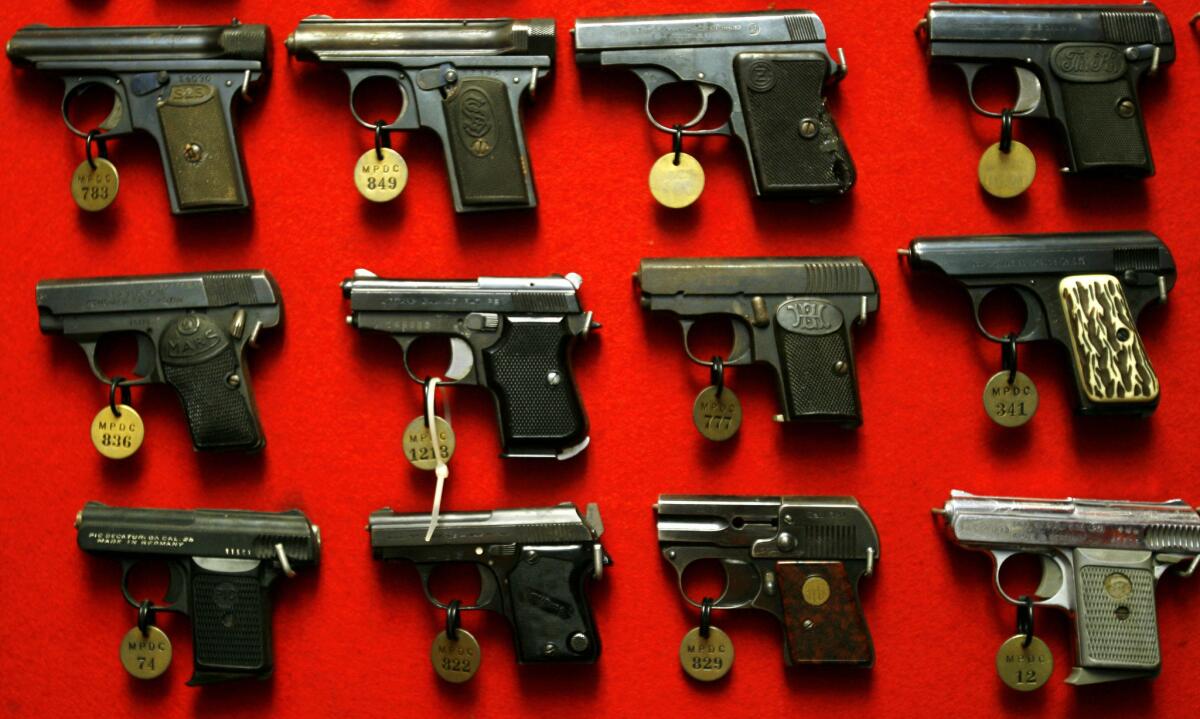Editorial: Where are the boundaries on owning guns?

A federal appeals court has struck down as unconstitutional parts of a gun-control law in the nation’s capital that imposed strict registration requirements on handguns and long guns.
The U.S. Supreme Court ruled seven years ago in District of Columbia vs. Heller that the 2nd Amendment “conferred an individual right to keep and bear arms,” but it also said that right was “not unlimited.” Government and courts have been wrestling ever since over just how far an individual’s right goes, and a decision Friday by the U.S. Court of Appeals for the District of Columbia Circuit may help draw some much-needed boundaries.
The District of Columbia has enacted stringent gun-control laws over the years, responding in large part to the city’s seemingly relentless gun violence. The 2008 case centered on a requirement that gun owners make their weapons essentially inoperable if they kept them in the house. The court tossed out that law as too restrictive, and established the individual right to keep a gun in the house for self-protection. The District of Columbia has since adopted more gun laws, drawing more court challenges.
First, the good part about the D.C. Circuit’s ruling, which doesn’t bind courts outside the nation’s capital but can influence them: It recognized that the government can require gun owners to provide a photograph and fingerprints to register a handgun because there is a legitimate public safety interest in doing so. It also said the government has the authority to require registration of long guns — shotguns and rifles. Both of those can help keep guns out of the hands of convicted felons, domestic abusers, the mentally ill and others barred by law from having them.
But the court also threw out the district’s monthly limit of one gun registration per person, which could open the door for challenges to a similar limitation here in California. And interestingly, the court rejected the requirement that a gun be presented when it is registered because doing so could risk public safety — an idea that may come into play in an unrelated case before the U.S. 9th Circuit Court of Appeals, which hinges on whether the 2nd Amendment confers a right to carry a weapon in public.
This page believes the Supreme Court erred in the initial Heller decision by upending an interpretation of the 2nd Amendment that had been embraced for half a century — that the amendment’s reference to a “well-regulated militia” limits the right to keep and bear arms to organized military units, such as the National Guard. Although that decision is the law of the land, so is the government’s right to regulate ownership. As the courts continue to define what that means, they should — as the D.C. Circuit sought to do — put public safety ahead of misguided notions of an armed nation.
Follow the Opinion section on Twitter @latimesopinion and Facebook
ALSO:
Can we pick out the mass shooters before they kill?
L.A. needs these sensible gun-control measures
Gun and self-defense statistics that might surprise you -- and the NRA
More to Read
A cure for the common opinion
Get thought-provoking perspectives with our weekly newsletter.
You may occasionally receive promotional content from the Los Angeles Times.










